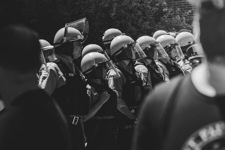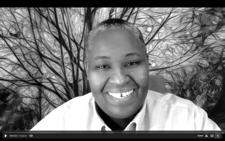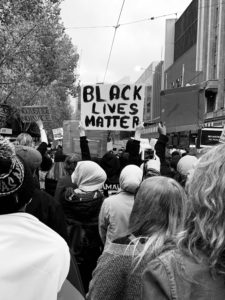MichaelTino
Breaking Our Hearts Open // Romper y Abrir Nuaestros Corazones
November 1, 2022Our hearts break open for the pain of the world. Read more →
Remembering // Recordando
November 1, 2022One of the annual events we recognize every November is the Transgender Day of Remembrance (TDOR). Read more →
A Compassionate Life
July 1, 2022Religious scholar Karen Armstrong has studied the teachings of religions large and small all around the world. And she has, as we all have, witnessed the strife in our world: the pain, the isolation, the injustice, the inequality. Read more →
Forgive Us Our Trespasses
March 1, 2022In April of 2019, I led a youth and adult delegation from the local congregation I serve on a service-learning trip to Pine Ridge, South Dakota. Read more →
Liberation and Salvation
January 10, 2022Rev. Dr. Michael Tino preached this Sermon on December 5, 2021 in the Church of the Larger Fellowship’s Online Sanctuary
Our Universalist ancestors believed that a powerful, radical love awaited them at death, a love so powerful as to be able to cleanse them of even their most vile sins, a love so radical as to be freely available to all. In the days when John Murray ran aground on a sandbar on the coast of New Jersey, it was a wild and heretical theology, this stuff of Universal salvation.
Over the ensuing two hundred and fifty-one years, a theology that holds that all people will ultimately be saved, a theology that rejects the eternal damnation of hell in favor of a reconciliation with a greater love, that theology is not so wild anymore. It is barely even heretical in some corners.
And yet, since Thomas Potter convinced John Murray to preach Universalism in his little chapel, our faith has struggled with the question of what Universalism calls us to in this life, before we die, right here. After all, if we’re all going to be saved anyway, why bother doing anything in this life? Why even bother being good?
Through the generations, our Universalist ancestors came up with decent responses to these questions. And today I want to call us to an answer that Clarence Skinner gave us some 80 years ago.
I don’t always agree with Clarence Skinner, 20th century Universalist theologian. For starters, his history of embracing eugenics is more than a little problematic.
But in particular, I think he led us astray by claiming that big-U Universalism was little-u universal—that we uniquely had a religion for all people and should strive to make it so. That’s modernist, colonizer talk right there, that little-u universal religion stuff. It asks us to point to the existence of a truth that is equally valid for all people, and to claim as that truth a theology of white Europeans and Americans. I don’t believe such a truth exists, much less that white folks would hold it, so I don’t do little-u universal religion.
But when Skinner asked the question “What does Universalism demand of us in this life?” he got to some things I find worthy of holding up.
Universalism, he insisted, call on us to fight the perpetuation of racism. In his 1945 work “A Religion for Greatness,” he wrote that racism is based in selfishness, superstition, and distortion. “If we ‘see life steadily and see it whole,’” he wrote, “we can appreciate all the parts. the part becomes misunderstood only when we see it without relationships, as an end in itself.” Each race, each culture, each difference in humanity, he wrote “has its own genius and each may contribute to a life that is ‘rounded, divine, [and] complete.’”
I believe it is our call to once again make our faith a radical, prophetic, challenge to the way things are. It is time to reclaim our place as the wild heretics pushing society forward, pushing theology forward, pushing humanity forward. It is time to re-think the powerful love our ancestors believed awaited them when they died as a powerful love available to us in the present, while we live.
I believe it’s time to re-think our theology of Universal salvation as a theology of universal liberation, right here.
I believe it’s time for Universalists to claim the radical, powerful love that our ancestors once attributed to God as a possibility of humanity.
Not as an automatic of humanity—we all know that real evil exists in our world, and that systems created by humans perpetuate evil daily—but as a possibility. Which makes our call, as Universalists, making it happen.
In 1915, ten years into his ministry and two decades before he became a professor at Tufts, Clarence Skinner published “The Social Implications of Universalism.” Here’s some of the non-problematic part of what he wrote:
“Universalism was born out of the new humanity; it is the gospel of the new heaven and the new earth. It throbs with hope. It was part of the great world movement to reinterpret life in terms of a regenerated, buoyant, self assertive human nature. Universalism believes in the world and in its potential goodness. It repudiates the gloomy and disastrous outlook of the old anti-social theology. It is not frantically searching for an escape from life.”
He continues, “Only those theologies which frankly and persistently align themselves with the world, and openly champion its potential goodness, can logically enter the great reformation of the twentieth century. They alone believe that salvation comes in, by and through a saved world. This is social salvation. All others believe that salvation comes by escaping from a world which is inherently unsavable. That is the individualistic, anti-social, mediæval faith. Goethe once said that the ideal is not an escape from reality but a completion of it. The Universalist conception of religion is not that of an escape from reality, but that of the harmonious and spiritual development of all the elements of real life.”
How do we persistently align ourselves with the world? How do we openly champion the potential goodness in our midst? What is our call? It is the collective liberation of all of humanity.
And not just the spiritual liberation of all of humanity, but the physical and emotional liberation of humanity as well. These things cannot be separated.
As long as we are not naming the white supremacy culture in our midst and openly, explicitly, constantly working to dismantle it, we are failing in our call to champion the goodness of humanity.
As long as listening to the voices of those who have experienced marginalization and naming the ways in which racism is systematized in our society are somehow controversial things to do, we are failing in our call to champion the goodness of humanity.
As long as violent, extractive capitalist systems are allowed to make policy—to block action on climate change, to enact colonial foreign policies, to abrogate the bodily autonomy of people with uteruses, to let this deadly virus run rampant in communities of color and schools because we insist that certain adult bodies are needed to show up for work, we are failing in our call to champion the goodness of humanity. These evils exist because someone is making money off them, and their money is power in a society that falls short of the radical love that is possible in this world.
And as long as our siblings are locked behind bars, as long as their bodies are fuel for the fire of our prison-industrial system, as long as we insist that punishment by dehumanization is a necessary response to breaking laws, as long as our nation’s constitution allows a loophole in our abolition of slavery for incarcerated people, we are failing in our call to champion the goodness of humanity.
And let’s make no mistake—the systems of injustice that I’m talking about today, these systems are using the very beings—the bodies and the spirits—of black people, indigenous people, people of color, of poor people, of disabled people, of queer people, of women and transgender people, as fuel for the creation of wealth for a very small number of folks.
Let me repeat that—the very bodies of those who are marginalized in so many ways around the world are being used as fuel. Our systems dehumanize people and then turn them into commodities to be used.
As surely as the fires of hell that John Murray rejected burned, human systems of evil burn.
And so it is our call as Universalists to reject that fire consuming our siblings.
It is our call as Universalists to amplify the radical, powerful love that we know humanity is capable of.
It is our call as Universalists to work for the liberation of all of humanity—for the spiritual emancipation that Clarence Skinner wrote of in 1915 as well as the physical emancipation so desperately needed in 2021.
“Light the fuse,” Skinner wrote, “and the fire will reach the bomb.” It is time to set off a love bomb on our world. It is time to act like we are worthy of the God of John Murray and Hosea Ballou, the God of Olympia Brown and Joseph Jordan, the God of Gloster Dalton and Amy Scott. Like we are worthy to call ourselves inheritors of a faith in which all are saved, in which all are free, in which all are loved.
It is time for us to practice radical, powerful, life-saving love. Liberation and salvation. Right here. Right now. Over and over again.
Mysterious Ways
December 1, 2021About a decade ago, my husband and I traded in our old cell phones for iPhones, a move that heralded a subtle but profound change in our lives. Read more →
Centering: A Little Bit At A Time
November 1, 2021REV. DR. MICHAEL TINO
Lead Ministry Team, Church of the Larger Fellowship
If there is to be peace in the world,
There must be peace in the nations. Read more →
Accountability Culture
May 1, 2021 In response to my November article about why we use the phrase “Black Lives Matter,” Clifford, a CLF member incarcerated in Illinois, asked me to look into the work of political philosopher Hannah Arendt, who wrote extensively about power and accountability from her vantage point as a survivor of the Holocaust in Germany. Read more →
In response to my November article about why we use the phrase “Black Lives Matter,” Clifford, a CLF member incarcerated in Illinois, asked me to look into the work of political philosopher Hannah Arendt, who wrote extensively about power and accountability from her vantage point as a survivor of the Holocaust in Germany. Read more →
CLF Votes to Ordain Ali K.C. Bell
April 1, 2021
Ali speaking during the February 28th online meeting in which the CLF voted to ordain xer to Unitarian Universalist ministry.
In our UU tradition, ministers are ordained by congregations. Only the vote of a congregation can give someone the title “Reverend.” Read more →
Black Lives Matter vs. All Lives Matter
January 1, 2021Renew Your Membership
We invite you to join your fellow CLFers to renew your CLF membership and stewardship of the CLF for another year.
Support the CLF
Can you give $5 or more to sustain the ministries of the Church of the Larger Fellowship?
If preferred, you can text amount to give to 84-321
Newsletter Signup
About
Quest for Meaning is a program of the Church of the Larger Fellowship (CLF).
As a Unitarian Universalist congregation with no geographical boundary, the CLF creates global spiritual community, rooted in profound love, which cultivates wonder, imagination, and the courage to act.
Contact
Church of the Larger Fellowship Unitarian Universalist (CLFUU)
24 Farnsworth Street
Boston MA 02210



